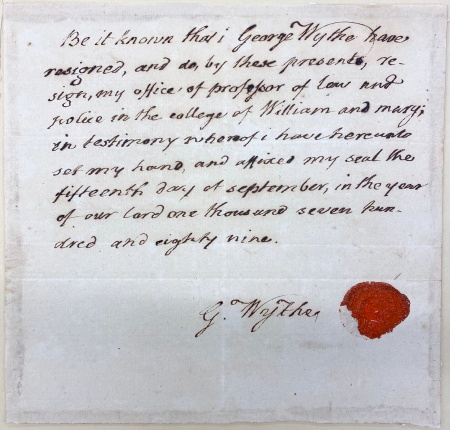Difference between revisions of "Resignation as Professor of Law and Police"
m |
m |
||
| Line 5: | Line 5: | ||
</blockquote> | </blockquote> | ||
| − | Other circumstances may have played a part. The Virginia High Court of Chancery, on which Wythe had served from its creation in 1778, had relocated to Richmond earlier in 1789. After Wythe resigned his position at the College, he moved to Richmond in 1791.<ref>Thomas Hunter, "The Teaching of George Wythe," in ''The History of Legal Education in the United States: Commentaries and Primary Sources'', ed. Steve Sheppard (Pasadena, CA: Salem Press, 1999), 157-158.</ref> | + | Other circumstances may have played a part in Wythe's decision. The Virginia High Court of Chancery, on which Wythe had served from its creation in 1778, had relocated to Richmond earlier in 1789. After Wythe resigned his position at the College, he moved to Richmond in 1791.<ref>Thomas Hunter, "The Teaching of George Wythe," in ''The History of Legal Education in the United States: Commentaries and Primary Sources'', ed. Steve Sheppard (Pasadena, CA: Salem Press, 1999), 157-158.</ref> |
==Manuscript text, 15 September 1789== | ==Manuscript text, 15 September 1789== | ||
Revision as of 08:01, 25 March 2024

This unaddressed document, dated September 15, 1789, is George Wythe's formal resignation as Professor of Law and Police at the College of William & Mary, stamped with his personal seal.[1] By this time, George Wythe had been a professor at William & Mary for nearly ten years and was still enthusiastic about teaching, but according to Thomas Jefferson, the politics of the College became too much to bear. The Rev. John Bracken had lost his post as Master of the Grammar School dissolved in 1779, and in 1789 sued the College's Visitors for reinstatement.[2] On December 14, 1789, Jefferson wrote to William Short:
Mr. Wythe has abandoned the college of Wm. & Mary, disgusted with some of the conduct of the professors, and particularly of the ex-professor Bracken, and perhaps too with himself for having suffered himself to be too much irritated with that. The visitors will try to condemn what gave him offence and press him to return; otherwise it is over with the college...[3]
Other circumstances may have played a part in Wythe's decision. The Virginia High Court of Chancery, on which Wythe had served from its creation in 1778, had relocated to Richmond earlier in 1789. After Wythe resigned his position at the College, he moved to Richmond in 1791.[4]
Manuscript text, 15 September 1789
Be it known that i George Wythe have resigned, and do, by these present, resign, my office of professor of law and police in the college of William and mary; in testimony whereof i have hereunto set my hand, and affixed my seal the fifteenth day of september, in the year of our lord one thousand seven hundred and eighty nine.
- G. Wythe.
See also
References
- ↑ Original at the John Carter Brown Library, Brown University, Providence, Rhode Island.
- ↑ J. W. Bridge, "The Rev. John Bracken v. The Visitors of William And Mary College: A Post-Revolutionary Problem in Visitatorial Jurisdiction," William & Mary Law Review 20, no. 3 (Spring 1979), 415-440.
- ↑ Thomas Jefferson to William Short, September 14, 1789, in The Papers of Thomas Jefferson, Volume 16: November 1789 to July 1790, eds. Julian P. Boyd, et al. (Princeton, NJ: Princeton University Press, 1961), p.25-26.
- ↑ Thomas Hunter, "The Teaching of George Wythe," in The History of Legal Education in the United States: Commentaries and Primary Sources, ed. Steve Sheppard (Pasadena, CA: Salem Press, 1999), 157-158.